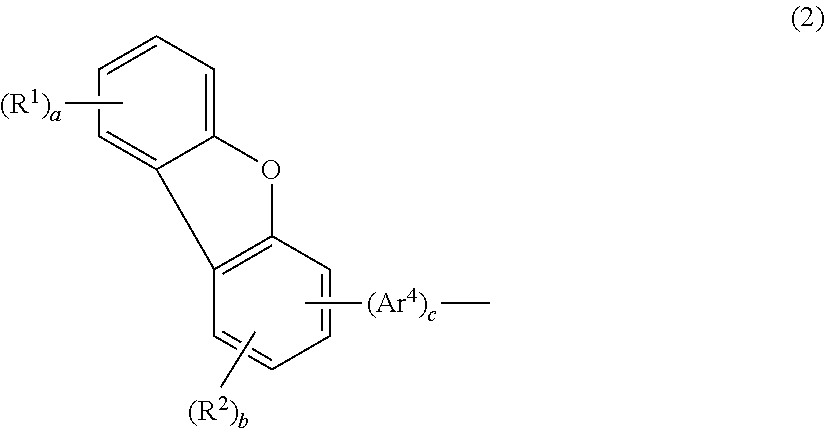Aromatic amine derivative and organic electroluminescence device
a technology of organic electroluminescence and amine derivative, which is applied in the direction of organic chemistry, luminescent compositions, other domestic articles, etc., can solve the problems of reducing the lifetime of light emission, increasing the driving voltage of the driving voltage, and reducing the current efficiency of light emission, so as to prolong the lifetime of organic el devices and improve yields
- Summary
- Abstract
- Description
- Claims
- Application Information
AI Technical Summary
Benefits of technology
Problems solved by technology
Method used
Image
Examples
synthesis example 1
Synthesis of Intermediate 1
[0202]Under an argon gas flow, 47 g of 4-bromobiphenyl, 23 g of iodine, 9.4 g of periodic acid dihydrate, 42 ml of water, 360 ml of acetic acid and 11 ml of sulfuric acid were placed into a 1000-ml three-necked flask. After stirring the resultant solution at 65° C. for 30 minutes, the reaction was allowed to proceed at 90° C. for 6 hours. The resultant mixture was poured into iced water, and then filtered. After having been washed with water, the resultant was washed with methanol to obtain 67 g of a white powder. The white powder was identified as Intermediate 1 from the analysis in accordance with Field Desorption Mass Spectrum (hereinafter, FD-MS) because the main peaks of m / z=358 and 360 were shown for C12H8BrI=359.
synthesis example 2
Synthesis of Intermediate 2
[0203]Performing a reaction in the same manner as in Synthesis Example 1 except that 2-bromo-9,9-dimethylfluorene was used instead of 4-bromobiphenyl, 61 g of a white powder was obtained. The white powder was identified as Intermediate 2 from the analysis in accordance with the FD-MS because the main peaks of m / z=398 and 400 were shown for C15H12BrI=399.
synthesis example 3
Synthesis of Intermediate 3
[0204]Providing 150 g (892 mmol) of dibenzofuran and 1 liter of acetic acid into a flask, the inside of the flask was replaced with the nitrogen gas and the resultant mixture was heated and dissolved. After dropping 188 g (1.18 mol) of bromine while sometimes cooling with water, the mixture was stirred under air-cooling for 20 hours. The precipitated crystal was separated by filtration, washed with acetic acid and water sequentially, and was dried under reduced pressure. After refining the resultant crystal with reduced-pressure distillation, it was subjected to re-crystallization with methanol repeatedly several times to obtain 66.8 g (yield: 31%) of 2-bromodibenzofran.
[0205]Under the atmosphere of argon gas, 400 ml of anhydrous THF was added to 24.7 g (100 mmol) of 2-bromodibenzofuran, and while stirring at −40° C., a hexane solution of n-butyllithium with 1.6 M concentration in an amount of 63 ml (100 mmol) was further added. The reacted solution was st...
PUM
| Property | Measurement | Unit |
|---|---|---|
| temperature | aaaaa | aaaaa |
| temperature | aaaaa | aaaaa |
| temperature | aaaaa | aaaaa |
Abstract
Description
Claims
Application Information
 Login to View More
Login to View More - R&D
- Intellectual Property
- Life Sciences
- Materials
- Tech Scout
- Unparalleled Data Quality
- Higher Quality Content
- 60% Fewer Hallucinations
Browse by: Latest US Patents, China's latest patents, Technical Efficacy Thesaurus, Application Domain, Technology Topic, Popular Technical Reports.
© 2025 PatSnap. All rights reserved.Legal|Privacy policy|Modern Slavery Act Transparency Statement|Sitemap|About US| Contact US: help@patsnap.com



